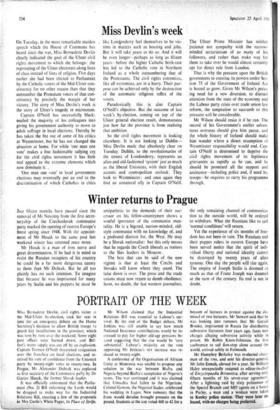PORTRAIT OF THE WEEK
Miss Bernadette Devlin, civil rights victor at the Mid-Ulster by-election, took her seat in time for an emergency debate on the Home Secretary's decision to allow British troops to guard key installations in the province, which was torn by riots over the weekend. Some eight post offices were burned down, and Bel- fast's water supply was cut off by an explosion. Captain Terence O'Neill threatened resignation over the franchise on local elections, and re- ceived his vote of confidence from the Unionist party by twenty-eight votes to twenty-two. In Prague, Mr Alexander Dubcek was replaced as first secretary of the Communist pafty by Dr Gustav Husak, the former Slovak leader.
It was officially announced that the Parlia- ment (No. 2) Bill reforming the Lords would be dropped to make way for the Industrial Relations Bill, enacting a few of the proposals in Mrs Castle's White Paper, In Place of Strife. Mr Wilson claimed that the Industrial Relations Bill was essential to Labour's sur- vival. By the. end of the Budget debate, Mr Jenkins was still unable to say how much National Insurance contributions would be in- creased to pay for higher old-age pensions be- yond suggesting that the rise would be 'very substantial.' Labour's majority on the vote approving Mr Jenkins's SET increase was re- duced to twenty-eight.
A conference of the Organisation of African Unity at. Monrovia was unable to propose any solution to the war between Biafra and Nigeria beyond Biafra's acceptance of Nigeria's terms. The war continued and it was claimed that Umuahia had fallen to the Nigerians. Colonel Gowon, the Nigerian-leader, celebrated his wedding in Lagos. New rumours that the franc would devalue brought pressure on the pound. Students at the LSE voted 468 to 42 for a boycott of lectures in protest against the dis- missal of two lecturers.-Mr Stewart said that he was looking into rumours that Mr Gerald Brooke, imprisoned in Russia for distributing subversive literature four years ago, faces new chargeS alleging subversive activity while in prison. Mr Robin Knox-Johnston, the first yachtsman to sail ion-stop alone around the world, arrived safely in Falmouth.
Mr Humphry Berkeley was re-elected chair- man of the UNA, and sent his director-general. Mr John Ennals, abroad for a year. Sir William Haley unexpectedly resigned as editor-in-chief of Encyclopaedia Britannica, after serving only fifteen months of his seven-year agreement. After a lightning raid by sixty policemen of the Special Branch and MI5 agents on a house in Purley, a man and a woman were taken to Kenley police station. They were later re- leased, with no charges being preferred.










































 Previous page
Previous page